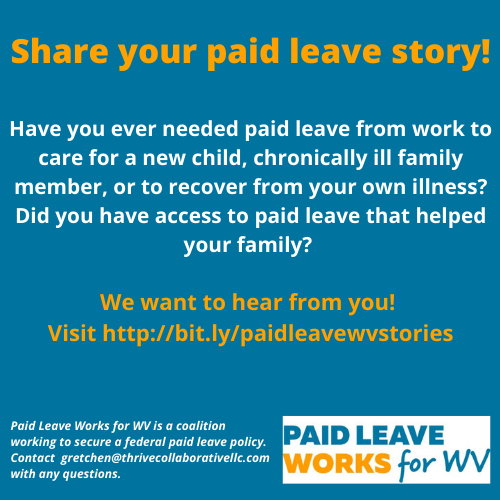The American Rescue Plan Act (ARPA), signed into law in March 2021, is a tremendous and unprecedented opportunity to invest in programs and projects that will increase public health and public safety as communities recover from the COVID-19 pandemic. The $1.9 trillion package’s flexibility allows for state and local governments to fund a wide range of programs that can reduce violence, recidivism, and homelessness, all while decreasing our reliance on the punitive criminal legal system. Included in ARPA is direct funding for state and local governments; West Virginia state government will receive $1.355 billion and local governments (cities, counties, and municipalities) in the state will receive $676.6 million. Our new blog post provides an overview of how state and local agencies and policymakers can use ARPA funds to equitably advance public safety in West Virginia.
The Council of State Governments Justice Center has outlined several justice-related goals that state leaders can support with funding available through ARPA. Our blog post explores each of the following goals:
– Keep People in Correctional Facilities Healthy
– Expand Access to Stable and Affordable Housing
– Improve Outcomes in Juvenile Justice
– Increase Access to Education and Job Training Opportunities for Justice-Involved People
– Support Victims and Address Trauma
– Expand Community Mobile Crisis Intervention Services
Our blog post merely scratches the surface of the innovative ways that West Virginia state and local governments could use ARPA funding to create safer communities. It is critical that governments use the money allocated under ARPA to uplift and support our most vulnerable friends and neighbors, rather than investing in the ineffective criminal justice strategies that we’ve historically relied upon.
Read Quenton’s full blog post.
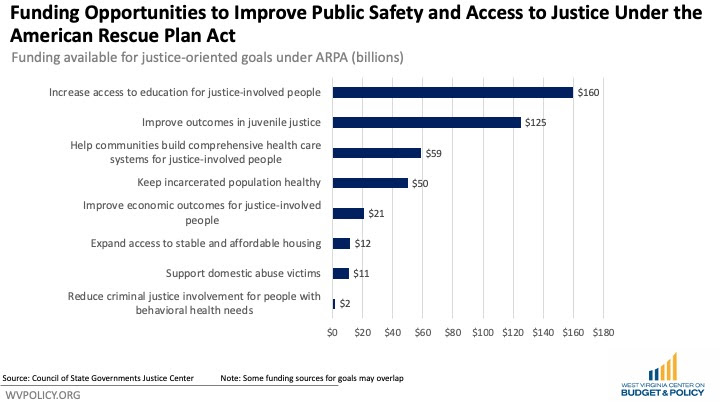
May is National Foster Care Month. West Virginia consistently has one of the highest rates of children in the foster care system, and as such, advocacy around this system and ensuring that as many children as possible can remain in their homes is of utmost importance.
Our new blog post explores a few meaningful ways that policymakers can do their part to alleviate the hardships on families that may lead to children interacting with the child welfare system. These include:
– Enhancing Paid Family and Medical Leave
– Making the Enhanced Child Tax Credit Permanent
– Supporting the Social Safety Net
As the country commemorates the incredible contributions that people throughout the foster care system have made, it must also continue to provide supports for the children who interact with child welfare and those who care for them.
Many thanks to all the parents, caretakers, and advocates who support the foster care system — both within West Virginia and across the country.
Read Rhonda’s full blog post.
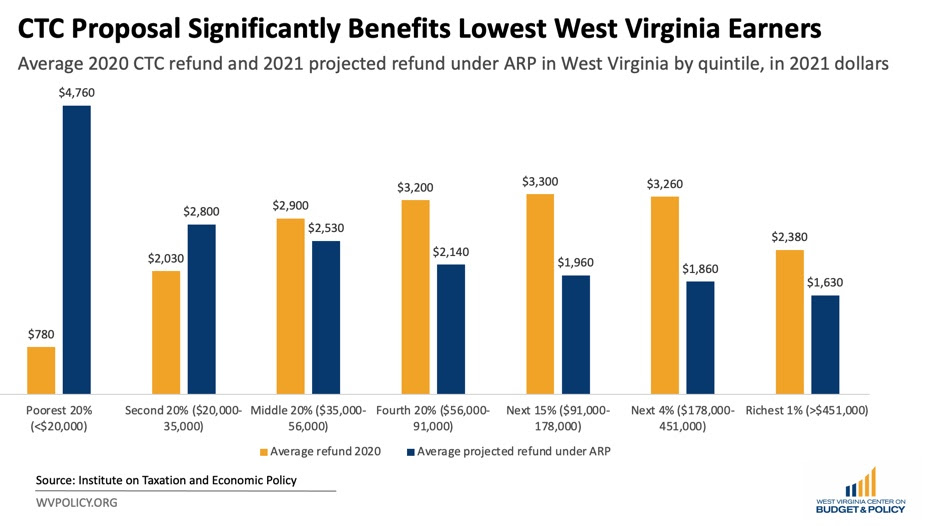
Under the American Rescue Plan Act (ARPA), West Virginia state government will receive $1.355 billion and cities, municipalities, and counties will receive a total of $676.6 million. ARPA funds are already flowing into communities and our state and can be used on eligible costs incurred through December 31, 2024.
Our new Fast Facts sheet highlights both best practices and US Department of the Treasury guidance to inform government officials and residents about the parameters for spending and the best ways to utilize these funds to make long-term improvements in our communities.
Treasury has identified five key areas of approved usage for ARPA Fiscal Recovery Funds:
– To Support Public Health Expenditures
– To Address Negative Impacts Caused by the Public Health Emergency
– To Replace Lost Public Sector Revenue
– To Provide Premium Pay for Essential Workers
– To Invest in Water, Sewer, & Broadband Infrastructure
You can find further explanation of each of the above categories, as well as examples of expenditures by category in the full Fast Facts sheet here. Or join us next Wednesday as we break it all down in our Facebook Live! We’ll be going live at 5:30pm ET on our Facebook page here.
For additional ARPA information, check out West Virginians for Affordable Health Cares’ American Rescue Plan WV County and City Funds Toolkit.
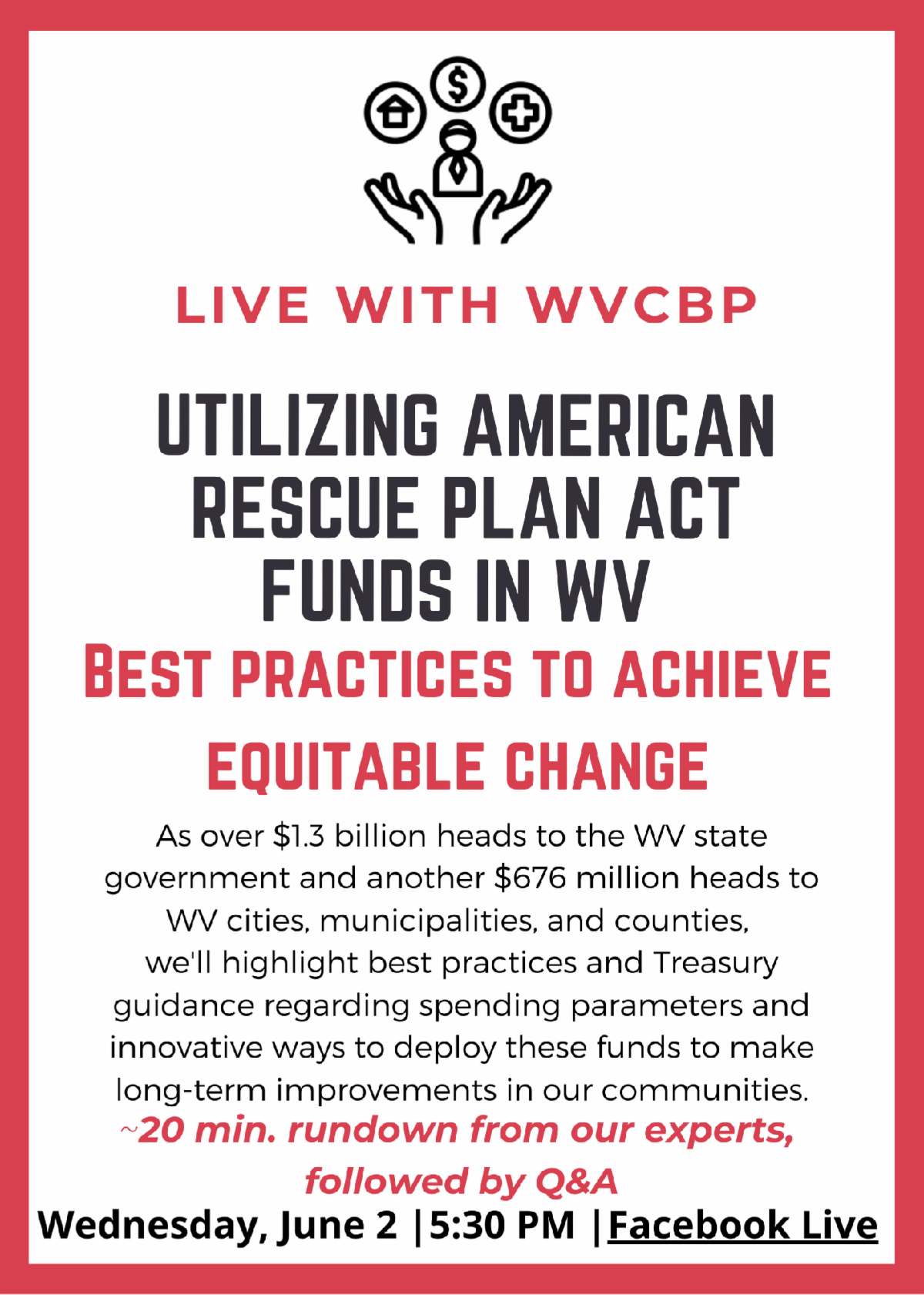
WVCBP’s Summer Policy Institute (SPI) is an annual event for college students, graduate students, and high school youth interested in bettering West Virginia through policy change. SPI brings together highly qualified traditional and non-traditional applicants to build policy knowledge, leadership skills, and networks.
Attendees participate in interactive sessions where they learn the basics of data, policy, and state government and build their organizing and advocacy skills. Throughout the convening, attendees work in small groups to identify and develop policy proposals to shape the future they want to see in West Virginia, culminating in team “policy pitches” to state legislators and policy professionals. Many SPI attendees have gone on to continue advocating for their policy idea and to hold internships with West Virginia non-profits and in state government.
SPI alum Matt Witt recently graduated with dual masters degrees in social work and public administration from WVU and is now set to launch his post-grad career continuing to serve folks in the Mountain State. In a recent op-ed, he writes about what attending SPI meant to him:
“This experience solidified my desire to stay in and serve West Virginia upon graduation, and it also connected me with relationships and job opportunities that could help me do just that.
“There’s been a lot of focus recently on how we can get young people to stay in our state, as well as how we might attract out-of-staters who might be looking to relocate here. In addition to having policies in place that make our state more welcoming to diverse populations of people, we also must foster connections and opportunities for our young people to do meaningful work here — either professionally or in their free time.
“The Summer Policy Institute provides a great place for young people to find that spark and the networks needed to launch a career in the Mountain State.”
Time is running out to apply for this year’s SPI! Registration is open through June 1. You can find further details and link to apply here.
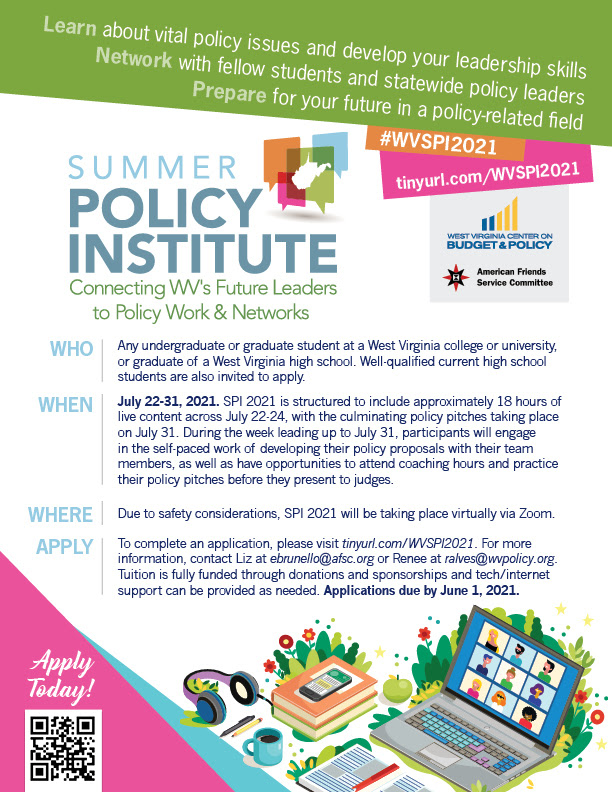
Last month, President Biden announced the American Families Plan (AFP) proposal, featuring major investments in K-12 education, child care, higher education, health care, and paid leave, as well as extended tax cuts for families and workers with children.
The AFP also includes revenue-raising proposals that would affect only very high-income taxpayers. And while the benefits of the AFP would be broadly shared, these tax increases would impact only .01 percent of West Virginia taxpayers — the smallest share in the nation — and work toward a tax system that raises more adequate revenue from those who have seen disproportionate income wealth gains in recent decades.
Join us in urging Senators Manchin and Capito to support the AFP and do their part to invest in West Virginia’s economic recovery and fund our future by sending them a letter here.
Find details of how the AFP benefits West Virginia children, workers, families, uninsured individuals, and veterans in our recent Twitter thread.
Learn more about how the AFP would serve as equitable tax reform in Sean’s full blog post.
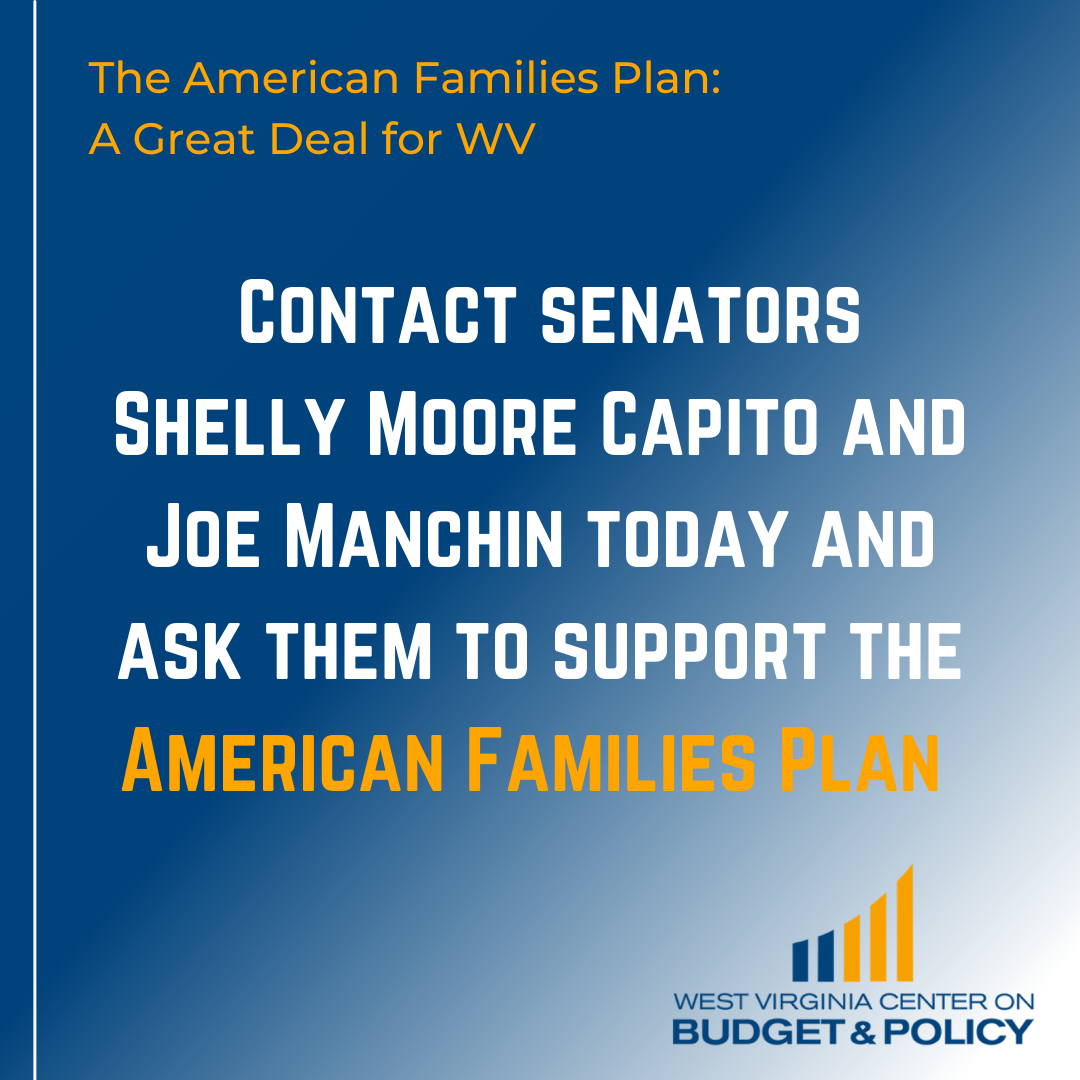
Earlier this week, the Drug Policy Alliance hosted part two of a webinar series unpacking the drug war. This installment included WVCBP health policy analyst Rhonda Rogombé and other advocates, who spoke about the connection between the drug war and the public benefits system.
Learn more about the discussion series and watch the recording of this week’s installment here.

collect stories from West Virginians who have struggled to access Medicaid across the state. Being conducted in partnership with West Virginians for Affordable Health Care, EMEE Voices will gather insight to inform which Medicaid barriers are most pertinent to West Virginians, specifically people of color. Existing data asserts that structural barriers and stigma impact Black and brown West Virginians’ interactions with the Medicaid program. However, more precise investigation is necessary for specifying these disparities and transforming them into meaningful policy choices. Overall, this project will synthesize quantitative data with the stories collected to provide a holistic understanding of Medicaid barriers. Addressing the obstacles West Virginians of color face will improve Medicaid for all West Virginians, contributing to a healthier state.
Do you have a Medicaid enrollment story to share? We’d appreciate your insight. If you are a Medicaid enrollee, please tell us about your experience here. If you are a Medicaid provider, please fill out our questionnaire here.
You can watch WVCBP’s health policy analyst Rhonda Rogombé and West Virginians for Affordable Health Care’s Mariah Plante further break down the new project and its goals in this FB Live.
You can find full project details on our webpage here.

The American Families Plan (AFP) is a historic opportunity to support the success of families and workers, and few places in the country will benefit as much as West Virginia – but only if the plan is passed.
Have you been impacted by lack of access to child care? We welcome you to share your experience with us by completing our survey. We’d appreciate your insight — responses will be used to help us show our leaders in Congress just how much the AFP would serve parents in the Mountain State.
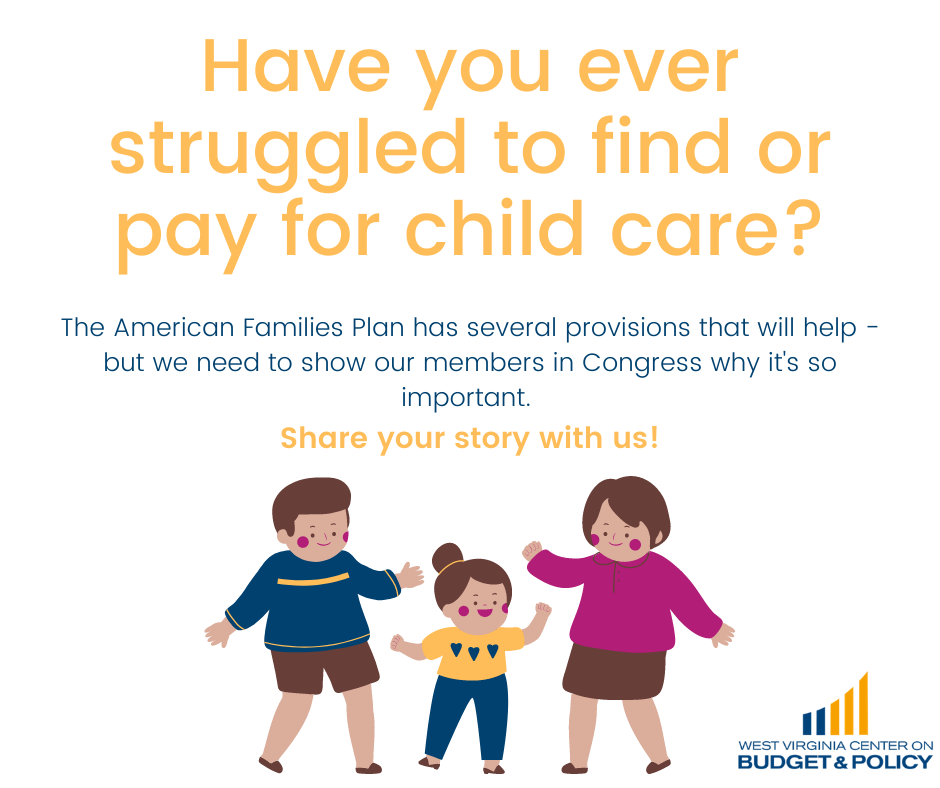
The Food for All coalition — along with 150+ signees including charitable food access agencies, food system practitioners, nutrition and health care professionals, directly impacted constituents, and more — have written Senators Manchin & Capito to vote to pass the American Families Plan and provide critical support to address food insecurity and poverty in West Virginia. This initiative would significantly reduce the food access barriers and burdens faced by hundreds of thousands of households in our state.
You can read the full letter here.
You can watch WVCBP policy outreach director Seth DiStefano discuss the efforts of the Food for All coalition and how it works to combat hunger and poverty in West Virginia in his recent interview here.
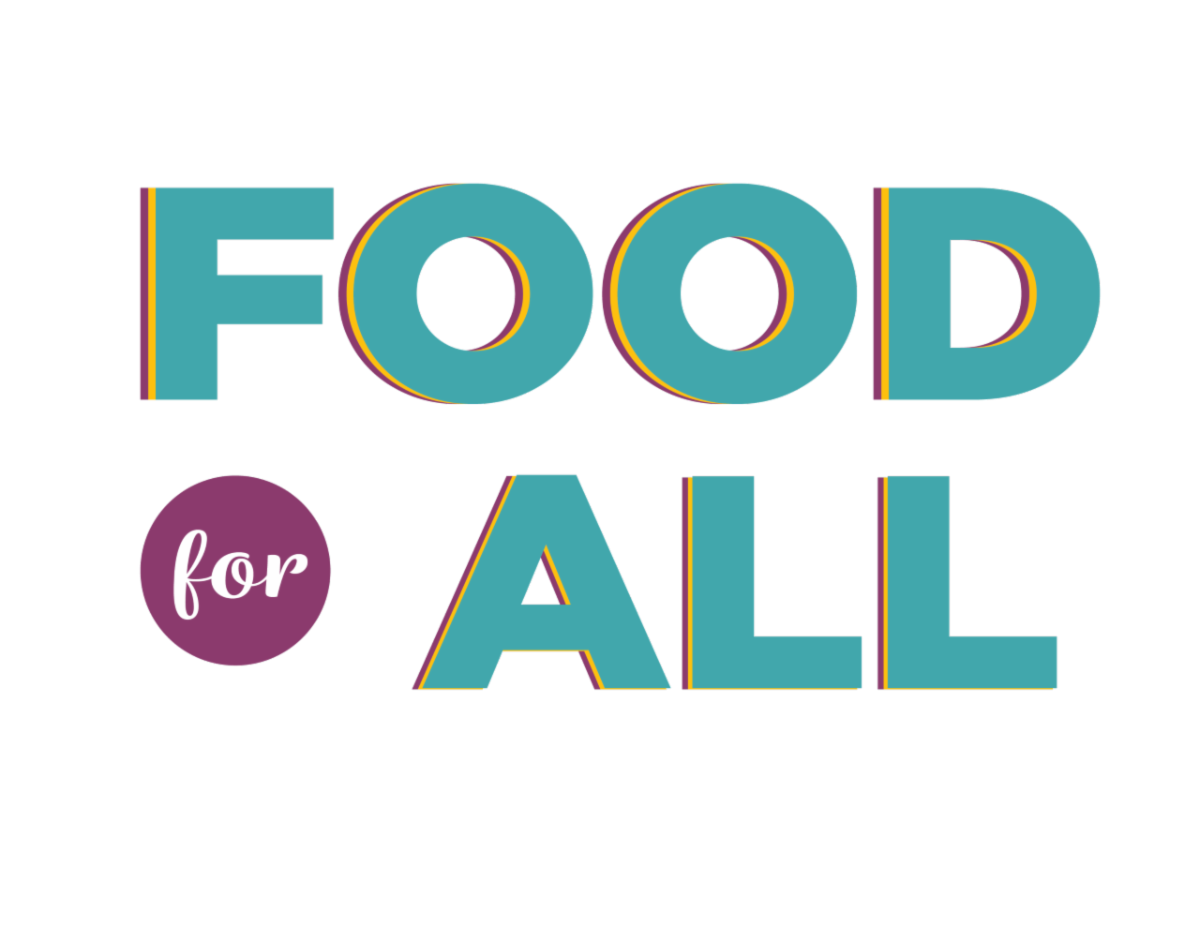
The Appalachia Prison Book Project is a West Virginia-based nonprofit that challenges mass incarceration through books, education, and community engagement. APBP sends free books to people imprisoned in six Appalachian states, hosts book clubs inside prisons in the region, and is leading an effort to bring for-credit college courses into prisons.
APBP is excited to announce that they are offering two $2,500 education scholarships for the 2021-2022 academic year. Each scholarship will be awarded to a person who has been released form a West Virginia Department of Corrections and Rehabilitation state prison or federal prison in WV and who will be beginning or continuing their undergraduate or graduate education at a college or university in WV. The applicant must have been released within three years of the application deadline.
You can find full scholarship details and instructions to apply here.

Paid Leave Works for WV (PLWWV) is a broad coalition of stakeholders focused on advocating for a robust paid family and medical leave policy that ensures no one has to choose between their job and caring for themselves or a loved one.
The coalition is looking to collect stories from across the Mountain State. If you and your family have benefited from paid leave or have struggled due to lack of access to paid leave, please share your story and help us advocate to make this policy available for all West Virginians. We encourage you to share the form with relevant friends and family members, too!
PLWWV has also begun a letter writing campaign to urge Senators Manchin and Capito to prioritize paid family and medical leave. You can send a letter here.
The WVCBP is a proud member of this new coalition. To stay up to date on the coalition’s work, follow them on Facebook, Twitter, and Instagram.
For more on the importance of paid leave and how it can help more women remain in the workforce, check out this recent article featuring insight from WVCBP executive director Kelly Allen.
